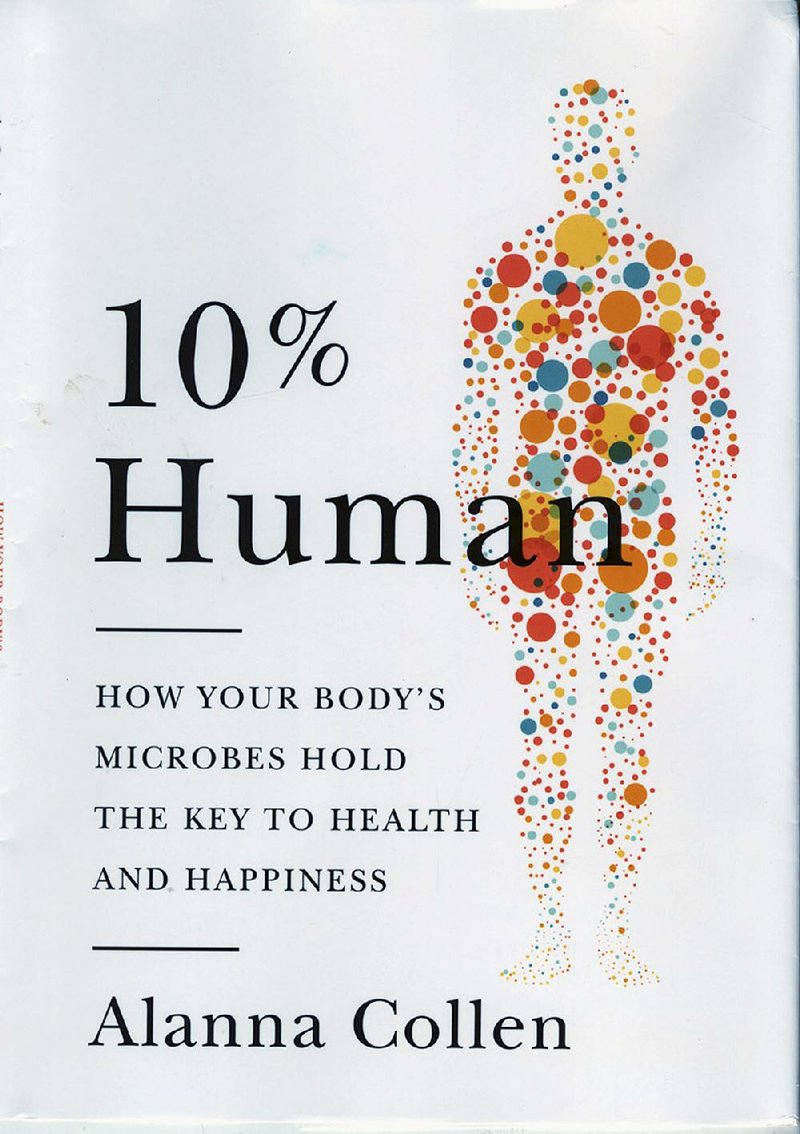10% Human: How Your Body's Microbes Hold the Key to Health and Happiness, by Alanna Collen (HarperCollins, 2015), 336 pages, 26.99 hardback, $10.74 paperback, $13.99 Nook book.
The title makes me distrust this book.
I hear ya. It assumes something unproved. But don't judge the book by its title. Alanna Collen is enthusiastic for the proposition that microbes of the human gut hold quite a few keys to health and also, possibly, to happiness, but she doesn't write as though that's demonstrated.
She writes about the search for proof.
After decades of slow growth in our understanding based on evidence cultured in petri dishes, brilliant new technology has allowed scientists to study bacteria, fungi, archaea -- micro thingies -- at a brisk pace: leaps have been made, but new questions are being asked.
Name one leap.
Research findings tend to discredit the "hygiene hypothesis" of disease resistance. Maybe kids don't develop asthma because Mom's so good at cleaning the house that their bored immune systems have nothing to do but attack them. Maybe she's cleaning away good microbes that prevent asthma. "It's not infections that we're lacking, but Old Friends," Collen writes.
She writes that research on microbe DNA suggests the healthy human body holds 10 times as many microbes as it holds human cells, and those microbes are enormously diverse. Our teeming "germiness" is good for us, because these friends do tasks that help us. And we aren't merely talking about helping to digest our food, although that's huge.
Persuasive studies in mice show that the blends of microbes in their guts influence how fat they become. Germ-free mice can be turned obese by implanting gut microbes from obese mice into them ... or by implanting gut microbes from obese humans.
Microbes also are first-line defenders in our immune system, aggressively crowding out invaders to whom we are not so well adapted and that can kill us.
They, some of them, make or cause us to make chemicals that affect brain function, even mood.
So I should eat pills full of good microbes to ensure I'm healthy?
Whoa, pony. This field of research is too young to be sure which microbes do what and for whom.
The half-gallon worth of bacteria, fungi and other teensy whatnots residing in and on each of us is a blend unique, different from every other one. The DNA of any two humans is almost totally the same, but their resident microbe colonies -- their microbiota -- are even more individual than ye proverbial fingerprints.
Why?
In part because we are what we eat -- or rather, our diets nurture certain strains of microbes. Eat mostly plants, you nurture microbes that can digest fiber and that pay you back by triggering processes that result in healthier intestines.
Also, in part, because of our exposures. Modern societies have been abusing our greatest life-saving tools, antibiotics. Food producers use them to fatten livestock faster and to raise hundreds of animals in close quarters disease-free. Even some organic farms are fertilized using manure from chemically treated livestock. Germ-phobic people slather themselves with antibacterial soaps and potions.
Such antibiotics kill some microbes but not all. Surviving strains proliferate. Resistance to broad-spectrum antibiotics has risen radically -- which is terrifying when you realize they used to save our lives and we need them still.
At the same time, since the 1950s, diabetes, obesity, autoimmune disorders, asthma, autism and other puzzling conditions have risen in frequency. Is there a connection? Some microbe research suggests there is, and that's Collen's topic.
Does she follow the logic off any cliffs? She's cautious. She takes pains to describe lack of scientific consensus on such controversies as "leaky gut" syndrome, for example. But is she enthusiastic for the "microbes-matter" approach to health care? Very much so.
Will my eyes hurt from squinting at footnotes? No footnotes. This is lively prose, even eloquent in places, and she explains the research by telling stories about people.
Is this the single best book on the subject?
That's the wrong question.
A highly readable pop-science book can be a helpful primer, as long as we don't imagine it is the last-word authority. Read one, think about how likely the evidence it presents seems; then read others and weigh what they say against what you read in the first book. The key thing is to remember what you don't know.
Will this book change my life?
If nothing else, it will motivate you to eat more fiber.
Collen writes that the signature difference between the diets of long-lived but sickly Westerners and the world's rare pockets of long-lived but healthy humans is plant fiber: They eat more than we do, and it is the diet staple of humanity's Old Friends.
Who is the author? A zoologist specializing in bat echolocation who has taken up science writing, Collen has a master's degree in biology and a doctorate in evolutionary biology from University College London and the Zoological Society of London. She is married and lives in Bedfordshire, England.
But more to the point, she caught a tick-borne tropical infection while studying bats and was cured by an extreme treatment with antibiotics. The negative aftereffects of her cure sparked passionate curiosity about her gut microbes, leading to an immersive study of new research.
Many pop-science writers have strong personal motivation, but not all of them have a good education and excellent verbal skills.
ActiveStyle on 07/27/2015
